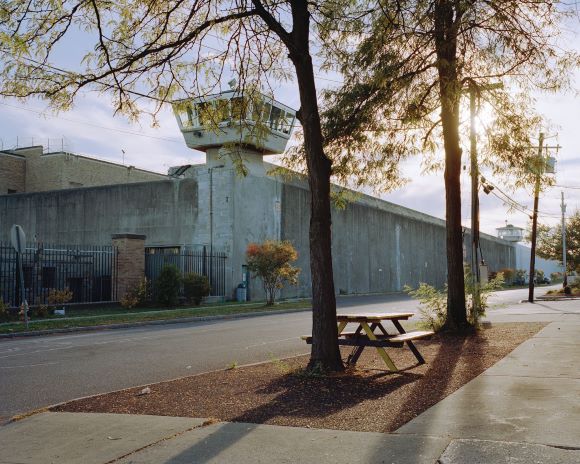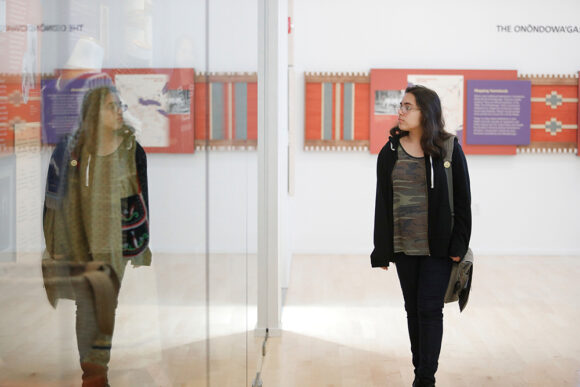SAS In Focus is the only newsletter devoted to everything happening in the School of Arts & Sciences. In this edition . . .
- “Going Upstate,” the research project about prison towns by Associate Professor of Anthropology Kristin Doughty and Religion Professor Josh Dubler, goes to Prison City, U.S.A.
- Research by Economics Professor George Alessandria may provide a roadmap for the ongoing U.S.-China trade war.
- “Experiencing Civic Life,” an exciting Humanities Center summer program for Rochester public high school students, secures funding for three more years.
- And more . . .
ON EXHIBIT: ‘GOING UPSTATE’

How did the phrase “going upstate” become synonymous with going to prison in New York? How do prisons in upstate New York shape everyday life in the communities they inhabit?
Those questions and more about the impact of the abundance of correctional facilities upstate is the subject of the multi-site exhibit “Going Upstate,” now being hosted by the Seward House Museum and Auburn Public Theater in Auburn, New York, through March 30. Of course, Auburn is nicknamed “Prison City” for a reason.
The exhibit is an ongoing collaborative ethnographic research project by associate professor of Anthropology Kristin Doughty and Associate Professor of Religion Josh Dubler.
If it sounds familiar, the project was on exhibit in the Hartnett Gallery on campus last year. Now, it’s findings its way into the cities and towns at the core of its subject.
FACULTY IN THE MEDIA

U.S.-CHINA TRADE WAR: The Economist reports that research co-authored by economics professor George Alessandria may provide a roadmap for the future of the ongoing U.S.-China trade war.
Former President Donald Trump has threatened to escalate the trade war he started in 2018 by imposing huge tariffs on Chinese goods if he’s re-elected in November.
Alessandria’s research examined how exporters responded to fiery rhetoric toward China by another presidential candidate, Ronald Reagan, in the election of 1980 and in his early years as president.
REDISTRIBUTING WEALTH: When it came to trying to make sense of federal funding disparities between states, the financial website WalletHub turned to David Primo, the Ani and Mark Gabrellian Professor of Political Science and Business Administration, for context.
Primo explained that the federal government plays an expansive role in society, but that given the differences between states and their needs, a “one-size-fits-all” approach doesn’t always make sense.
“It is best to think about federal resources as going to people, not states,” Primo was quoted as saying. “Viewed in this way, we can then ask, ‘How big a role should the federal government play in redistributing wealth?’ That is something we have debated for centuries.”
GRANTS

‘Experiencing Civic Life’
The Teagle Foundation, which aims to strengthen liberal arts education as a means toward effective citizenship and a fulfilling life, has provided $120,000 to help keep the University’s “Experiencing Civic Life” program running for another three years.
Since 2019, the Humanities Center has offered “Experiencing Civic Life,” an intensive two-week residential summer program for up to 15 students in Rochester public high schools.
Students explore classic texts, enhance their critical reading and writing skills, chat with University professors and students, and take field trips to institutional pillars of our society – museums, historic sites, and a courtroom.
The whole point of the program is to enrich their lives and prompt them to think about a future that may include college. The program is free, but it takes resources to keep it running.
‘The Ethics of Reparations’
William H. Bridges IV, the Arthur Satz Professor of the Humanities, has been awarded a “New Directions” fellowship by the Andrew W. Mellon Foundation to advance his research on inequality and reparations.
The distinction comes with a $300,000 grant, to be paid over the next three years, that will enable him to study at Cornell University and Georgetown University with an eye toward adding to the curriculum at Rochester and potentially establishing a research institute here for the study of reparations and intergenerational justice.
Bridges intends to publish his research in a special issue of the Journal of Social and Cultural Possibilities and a monograph, “The Ethics of Reparations in Six Deaths.”
WHAT WE’RE PUBLISHING
An American Society for Microbiology journal has accepted for publication a research article co-authored by Dean Nicole Sampson.
The article, titled “Uncovering the Roles of Mycobacterium tuberculosis melH in Redox and Bioenergetic Homeostasis: Implications for Antitubercular Therapy,” will appear in the journal mSphere.
When our bodies try to kill the bacteria that causes tuberculosis, a protein called melH kicks into action to help the bacteria resist. The piece reveals a potential new way to fight off TB.
AROUND ROCHESTER: TAKING YOUR PULSE
The University’s strategic plan, Boundless Possibility 2030, launched six months ago, and University Communications and the President’s Office want to know what you know about it.
They’ve launched a Strategic Plan Pulse Survey with the hope of getting responses from faculty, staff, and students across the institution. The idea is to help Communications improve its outreach on the subject and refine goals for increasing understanding about the plan’s aims.
It takes less than a minute to complete and the responses are anonymous. Ready? Set? Go.
ON THE HORIZON . . .
3.22-24 – DataFest – Do you know an undergraduate student hungry to put their problem solving and analytical skills to the test with real professional data? If so, tell them about DataFest.
DataFest is an annual data analytics competition at Rochester Institute of Technology run by the American Statistical Association that’s something of a mashup of statistics, data science, and quick thinking.
There’s still time to register individually or with a team. Data scientists can also register to take part as a mentor.
3.27 – Graduate Research Symposium – The Office of Graduate Education and Postdoctoral Affairs hosts the third annual Graduate Research Symposium on March 27 in Feldman Ballroom at Douglass Commons.
The symposium features research conducted by graduate students in the School of Arts & Sciences and the Hajim School of Engineering & Applied Sciences.
A poster session is scheduled from 3 to 4:30 p.m., followed by the presentation of monetary awards and a networking reception until 5:30 p.m.
3.29 – “The Climate of Critical Theory” Symposium – Last year marked the centennial of the founding of the Institute for Social Research, also known as the Frankfurt School of Critical Theory.
To commemorate the occasion, Jonathan Catlin, of the Humanities Center, and Joel Burges, associate professor of English and visual and cultural studies, have organized this daylong symposium in the Humanities Center, Conference Room D.
The event opens at 8:30 a.m. with a light breakfast, and runs through 6:30 p.m., with time devoted to discussions on critical theory as it pertains to economic and historical climates, and in the face of ecological catastrophe.
Check out the full agenda here.
GOT NEWS TO SHARE?
Send your SAS In Focus news tips to SAS Senior Communications Officer David Andreatta at david.andreatta@rochester.edu.